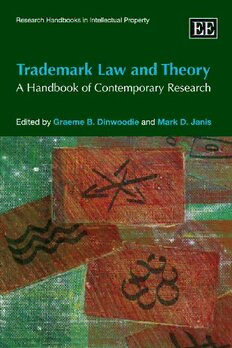
Trademark Law and Theory: A Handbook of Contemporary Research PDF
554 Pages·2008·1.658 MB·English
Most books are stored in the elastic cloud where traffic is expensive. For this reason, we have a limit on daily download.
Preview Trademark Law and Theory: A Handbook of Contemporary Research
Description:
This important new research Handbook brings together a set of illuminating works by the field's leading scholars to comprise one of the broadest and most far-reaching overviews of trademark law issues. Organized around three areas of inquiry, the book starts by offering a rich variety of methodological perspectives on trademark law. The contributors have drawn from law and economics, property theory, semiotic theory, and history - reflecting the multifaceted nature of contemporary trademarks. The Handbook goes on to survey trademark law's international landscape, addressing indigenous cultural property, human rights issues, the free movement of goods, and the role of substantive harmonization.It concludes with a series of forward-looking perspectives, which focus on trademark law's intersection with other bodies of regulation, such as advertising and speech, copyright law, cyberspace regulation, and design protection. Discussing critical future issues regarding trademark protection and its relationship with other social policies, this Handbook will be of great interest to law scholars, trademark lawyers and law students. It will also be of interest to academics in marketing, business, consumer psychology, and economics.
See more
The list of books you might like
Most books are stored in the elastic cloud where traffic is expensive. For this reason, we have a limit on daily download.
